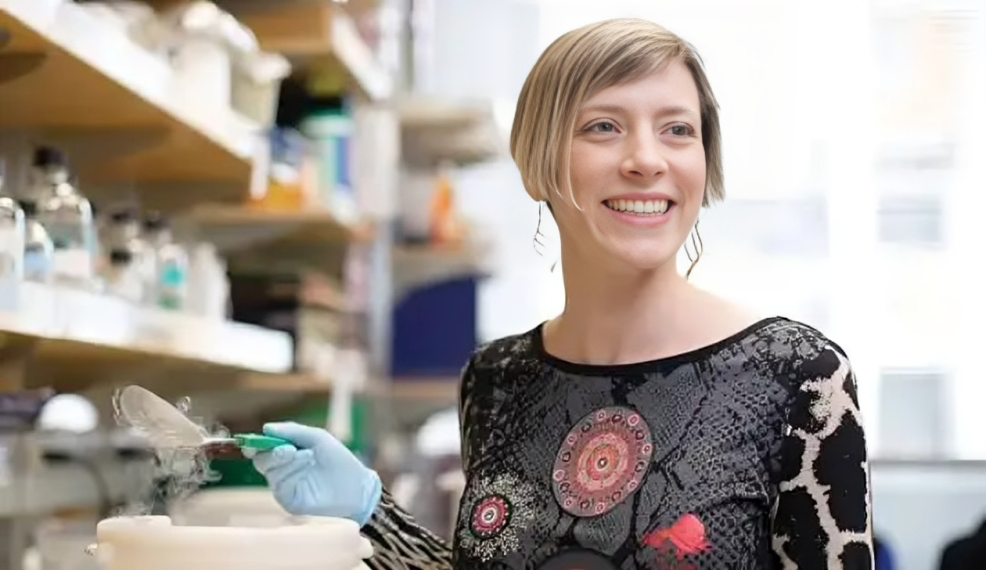Susanna F. Greer, Chief Scientific Officer at the V Foundation, shared on LinkedIn:
“Lung cancer with mutations in the KRAS genes is very tough to treat. the V Foundation grantee Dr. Lillian Eichner recently published an incredible study showing she’s found out a way to send immune cells directly into KRAS mutant lung tumors – directly opening doors to new, more effective therapies.
This researcher is the best kind of party crasher!
For this week’s Cool Cancer Find, we dive into a study focused on lung cancer, the leading cause of cancer-related deaths in the United States, and KRAS, the most frequently mutated oncogene in lung cancer. This study comes from the V Foundation grantee Dr. Lillian Eichner and her lab at Northwestern University.
To help us understand the impact of Dr. Eichner’s work, and to ensure we all understand what an oncogene is and does, imagine your body as a neighborhood, where different cells are like houses with unique ‘residents.’
In this neighborhood, sometimes a ‘bad neighbor’ moves in – in this case, it’s the lung cancer cell with a mutation in the KRAS gene. This cell doesn’t play by the neighborhood’s ‘rules’ and can resist typical cancer treatments, making it tough to get rid of. The biggest challenge is that this cell not only grows quickly but also avoids and even keeps out the ‘neighborhood watch’ – in this case, T cells, which are immune system cells that usually help control our neighborhood and eliminate troublemakers. So our new ‘bad’ neighbor grows and grows and quickly takes over the neighborhood.
Dr. Eichner’s study focuses on a ‘gatekeeper’ protein called HDAC3, which these growing cancer cells use to keep the T cells out. Imagine HDAC3 as a ‘security guard inside the cancer cell who is strict about who gets in and out. Now, this particular security guard isn’t a hero; in fact, it’s doing cancer a huge favor by blocking signals that would normally call the immune system’s ‘bodyguards’ – the T cells – to come help.
Without T cells on the scene, the cancer cells can throw a big party, multiply freely, and become even harder to treat.
What Dr. Eichner and team discovered is that blocking, or calming down, HDAC3 (our overprotective security guard), is like turning on an “immune alert” signal. Suddenly, the T cells see the party going on, realize there’s trouble, and rush over to help get rid of the cancer cells. This approach brings in reinforcements right where we need them, in the heart of the tumor.
Why is this exciting? Well, lung cancer with these KRAS mutations is like a “party-crasher” that’s been tough to get rid of. Dr. Eichner’s study shows that if we can control HDAC3’s behavior, we might finally have a way to let the body’s own immune fighters into the party to break it up. This discovery is thrilling because it taps into the body’s own defense system, turning it against a type of lung cancer that’s been incredibly hard to beat!
By figuring out how to send T cells directly into KRAS mutant lung tumors, this research could open doors to new, more effective therapies, giving patients a fighting chance against even the toughest cancers. I love this paper – congratulations team Eichner!
Find the Eichner lab and Dr. Eichner’s paper.”
Transcriptional repression by HDAC3 mediates T cell exclusion from Kras mutant lung tumors
Authors: Caroline K. McGuire, Ambryn S. Meehan, Evan Couser, Lois Bull, Allegra C. Minor, Alexandra Kuhlmann-Hogan, Susan M. Kaech, Reuben J. Shaw, and Lillian J. Eichner
More posts featuring Susanna F. Greer on oncodaily.com
Susanna F. Greer is the Chief Scientific Officer at the V Foundation. Before this role, Dr. Greer was a Senior Scientific Director at the American Cancer Society, where she led the Biochemistry and Immunology of Cancer Research Program. Greer’s work focuses on identifying crucial signaling pathways in the immune response to cancer and has led to significant discoveries in molecular immunology and new epigenetic targets.


